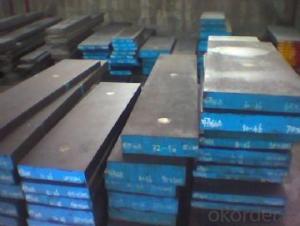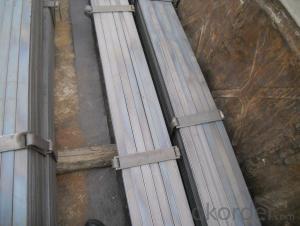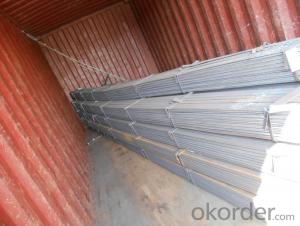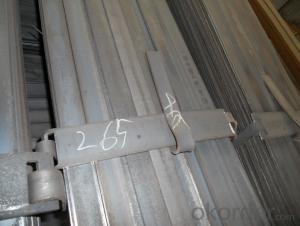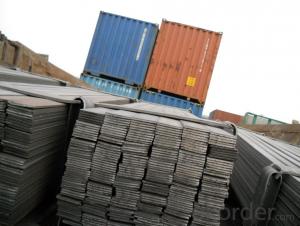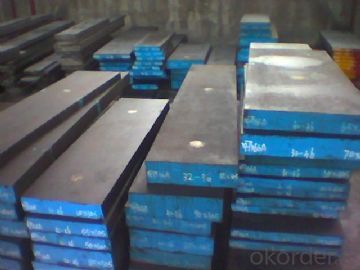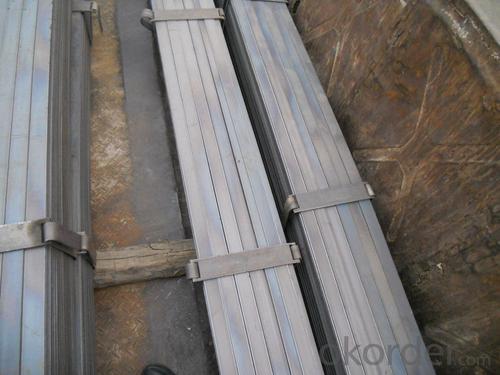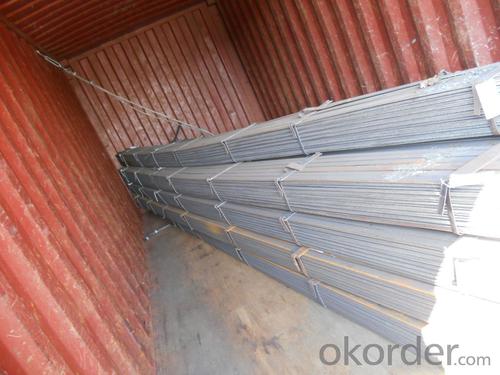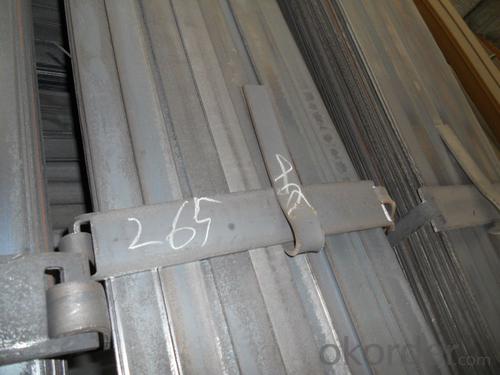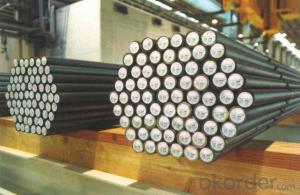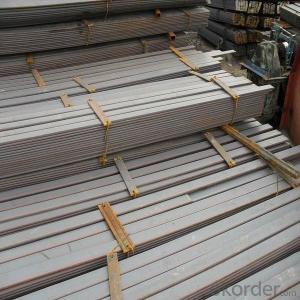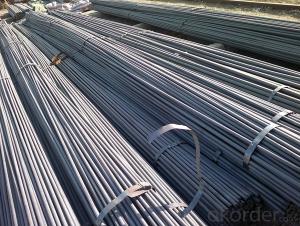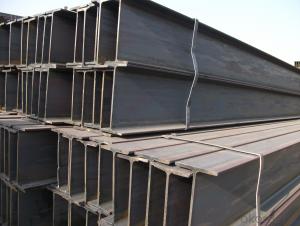Prime Hot rolled Spring Steel Bar/billet/products JIS standard/Europe standard/ ASTM standard
- Loading Port:
- Shanghai
- Payment Terms:
- TT OR LC
- Min Order Qty:
- 50 m.t.
- Supply Capability:
- 1200 m.t./month
OKorder Service Pledge
OKorder Financial Service
You Might Also Like
Specifications
Spring steel flat bar
Garde: 60Si2Mn, 60Si2MnA, 55CrMnA,50CrVA
Standard GB,JIS,ASTM,DIN,AISI,BS
LF & VD forge;ISO&TUV appr
Materials
Q195,Q215,Q235B,Q345B,
S235JR/S235/S355JR/S355
SS440/SM400A/SM400B
Product Category
Metallurgy,Mineral &Energy
Technique
HOT ROLLED
Packing
1.Big OD:in bulk
2.Small OD:packed by steel strips
3.woven cloth with 7 slats
4.according to the requirements of customers
Usage
Mechanical&manufacture,Steel strcuture,
Shipbuilding,Bridging,Automobile chassis
Main market
Middle East,Africa, Asia and some Uropean country and America ,
Australia
Country of origin
China
Productivity
15000 Metric Tons pet Month
Remark
Payment terms :T/T ,L/C
Terms of trade :FOB ,CFR,CIF ,DDP,EXW
Minimum order : 10 tons
Lead time :on or before 3-15 working days .
- Q: What are the main applications of special steel in the defense aircraft?
- Special steels are used in defense aircraft for various critical applications such as manufacturing aircraft components, structures, and armor. These steels possess exceptional strength, durability, and resistance to corrosion and heat, making them suitable for challenging environments. Special steels find applications in components like landing gears, engine parts, rotor blades, and missile systems, where their high performance and reliability are essential for ensuring the safety and effectiveness of defense aircraft.
- Q: What are the different types of maraging steel?
- There are several different types of maraging steel, including Maraging 200, Maraging 250, Maraging 300, and Maraging 350. Each type has different composition and properties, but they all share the common characteristic of being a high-strength, low-alloy steel that can be heat treated to achieve exceptional strength and toughness.
- Q: What are the different methods of surface lapping for special steel?
- There are several methods of surface lapping for special steel, including abrasive lapping, diamond lapping, and chemical lapping. Abrasive lapping involves using an abrasive material, such as silicon carbide or aluminum oxide, to remove small amounts of material from the surface of the steel. Diamond lapping, on the other hand, utilizes diamond particles to achieve a high level of precision and smoothness. Chemical lapping involves using a chemical compound that reacts with the steel surface, selectively removing material to achieve the desired finish. Each method has its own advantages and is chosen based on the specific requirements of the steel and the desired outcome.
- Q: What are the different types of corrosion-resistant steel?
- There are several types of corrosion-resistant steel, including stainless steel, weathering steel, and galvanized steel. Stainless steel is the most common type, known for its high resistance to corrosion due to the presence of chromium. Weathering steel forms a protective rust-like layer, providing long-term corrosion resistance. Galvanized steel is coated with a layer of zinc, which acts as a barrier against corrosion.
- Q: How is bearing steel used in the manufacturing of bearings?
- Bearing steel is specifically designed for the manufacturing of bearings due to its high hardness, wear resistance, and excellent rolling contact fatigue strength. This type of steel is used to produce the inner and outer rings, as well as the rolling elements of bearings. It undergoes a specialized heat treatment process to enhance its mechanical properties and ensure proper microstructure. The use of bearing steel in manufacturing ensures the durability and longevity of bearings, allowing them to withstand heavy loads, high temperatures, and corrosive environments.
- Q: Is special steel suitable for electrical and electronic applications?
- Yes, electrical and electronic applications can benefit from the use of special steel. Special steel refers to steel alloys that are specifically designed to have certain properties or characteristics that make them suitable for specific applications. When it comes to electrical and electronic applications, special steel offers several advantages. One of the main requirements for electrical and electronic applications is high electrical conductivity. Although steel is not known for its electrical conductivity, certain special steel alloys can be engineered to have improved electrical conductivity. For example, by adding elements like nickel or copper to stainless steel, its electrical conductivity can be enhanced, making it suitable for applications where efficient flow of electrical current is needed. Magnetic properties are also important for electrical and electronic applications. Some special steel alloys exhibit exceptional magnetic properties, making them ideal for use in transformers, motors, and generators. These alloys possess qualities such as high magnetic permeability, low coercivity, and low hysteresis losses, which are crucial for efficient energy transfer and minimal power loss. Additionally, special steel provides excellent corrosion resistance, which is essential for electrical and electronic equipment that may come into contact with moisture or harsh environments. Stainless steel, for instance, is highly resistant to corrosion, ensuring the longevity and reliability of the equipment. In conclusion, special steel can be suitable for electrical and electronic applications when it possesses the necessary electrical conductivity, magnetic properties, and corrosion resistance. Manufacturers can ensure the performance, durability, and reliability of electrical and electronic equipment by selecting the appropriate special steel alloy.
- Q: What are the common failures or issues with special steel?
- There are several common failures or issues that can occur with special steel. One of the most common issues is corrosion. Special steel, like any other type of steel, can be prone to corrosion when exposed to certain environmental conditions, such as moisture or aggressive chemicals. This can lead to a decrease in its structural integrity and overall performance. Another common failure is fatigue. Special steel is often used in applications that require high strength and durability. However, repetitive loading or stress can cause the material to develop cracks or fractures over time, leading to fatigue failure. This can be particularly problematic in industries such as aerospace or automotive, where components are subjected to constant cyclic loading. In addition, improper heat treatment can result in failure. Special steel often requires specific heat treatments to achieve desired properties such as hardness or toughness. If the heat treatment process is not carried out correctly, it can lead to inconsistent material properties, resulting in reduced performance or premature failure. Welding issues can also occur with special steel. Welding is commonly used to join different components or structures made of special steel. However, if proper welding techniques and procedures are not followed, it can result in the formation of defects such as weld cracks, porosity, or inadequate fusion. These defects can weaken the weld joint and compromise the overall integrity of the structure. Lastly, dimensional instability can be a problem with special steel. Certain types of special steel, such as those with high carbon content, can exhibit dimensional changes when subjected to temperature variations. This can lead to distortion or warping of the material, affecting its fit, function, or assembly with other components. To mitigate these failures or issues with special steel, it is crucial to follow proper material selection, design, manufacturing, and maintenance practices. Conducting thorough inspections, implementing appropriate corrosion protection measures, and ensuring proper heat treatment and welding procedures can help minimize the occurrence of these failures and enhance the performance and longevity of special steel components.
- Q: Can special steel be used in the production of medical implants?
- Medical implants can indeed utilize special steel materials. Examples of these special steels include stainless steel, titanium alloy, and cobalt-chromium alloy. These steels possess unique properties that make them suitable for medical purposes. Notably, they are biocompatible, meaning they do not cause any adverse reactions or toxicity within the human body. Additionally, they exhibit high strength, corrosion resistance, and the ability to withstand the harsh conditions found inside the human body. Consequently, special steels can be employed in the production of various medical implants, such as orthopedic implants like hip and knee replacements, dental implants, cardiac stents, and surgical instruments. By incorporating special steel into medical implants, durability, longevity, and biocompatibility are ensured, thus providing patients with a dependable choice to enhance their quality of life.
- Q: What is the impact of impurities on the properties of special steel?
- The presence of impurities in special steel can have significant impacts on its properties. Impurities can alter the steel's mechanical properties, such as strength, hardness, and toughness. They can also affect the steel's corrosion resistance and thermal conductivity. Additionally, impurities can lead to microstructural defects, such as grain boundaries or inclusions, which can further weaken the steel. Therefore, minimizing impurities is crucial in order to achieve high-quality special steel with desirable properties.
- Q: How does the cost of special steel compare to regular steel?
- The cost of special steel is generally higher than regular steel due to its unique properties, manufacturing processes, and limited availability.
Send your message to us
Prime Hot rolled Spring Steel Bar/billet/products JIS standard/Europe standard/ ASTM standard
- Loading Port:
- Shanghai
- Payment Terms:
- TT OR LC
- Min Order Qty:
- 50 m.t.
- Supply Capability:
- 1200 m.t./month
OKorder Service Pledge
OKorder Financial Service
Similar products
Hot products
Hot Searches
Related keywords
